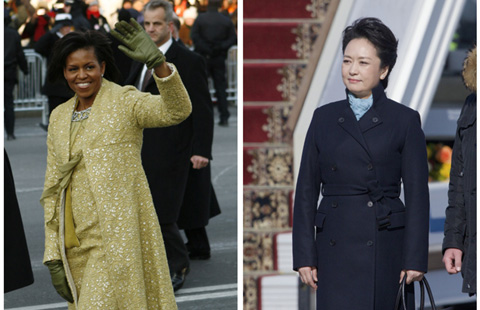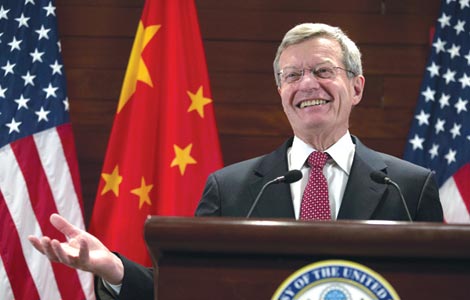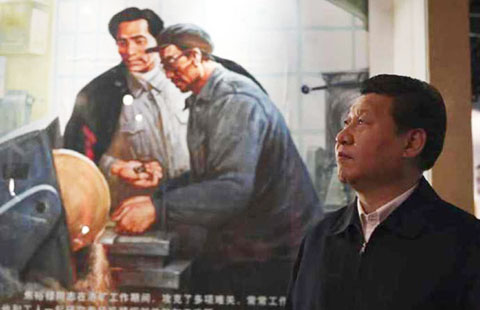US House members to study reforms on China trip
Updated: 2014-03-15 04:40
By CHEN WEIHUA in Washington (China Daily)
|
||||||||
US Congressman Rick Larsen is leaving for his ninth trip to China on Saturday, but this time on crutches.
The Democrat House member from Washington state is still recovering from a broken ankle.
Larsen, co-chair of the House US-China Working Group, will be joined on the week-long trip by three other House members.
He says the trip is aimed at understanding the role of China's economic reforms announced since the Third Plenum of the 18th Central Committee of the Communist Party of China in November.
"From the United States' perspective, understanding the economic reform proposed and how it relates to the US-China economic relationship is very important and will have an impact on US policy and US economic policy toward China," Larsen told China Daily.
The National Committee on US-China Relations is arranging the trip, which begins on Sunday and will take the group to Beijing, Xi'an and Guangzhou. Committee president Steve Orlins is already in China.
In Beijing, the group will meet top Chinese officials to discuss and learn about China's economic reforms, while in Xi'an it will visit the aerospace manufacturing industry.
"I am mainly driving that part of the agenda because I want to understand better the role and future of the Chinese aviation industry," said Larsen, smiling and looking back at a Boeing plane model in one corner of his office.
"I think the Chinese government expects the aviation industry to be a major part of its growing economy in the future."
The three other House members on the trip are Charles Boustany, a Louisiana Republican who co-chairs the working group; Kenny Marchant, a Republican from Texas; and Mike Quigley, a Democrat from Illinois.
The group will also include two Congressional staff members from Larsen's and Boustany's offices as well as Fordham Law School professor Carl Minzner, a specialist on China's legal system.
Larsen feels the trip to Guangzhou, a trailblazer of China's economic reform in past decades, will help the group understand how economic reform will work in a city that is far from Beijing.
He said he has received positive messages about China's economic reforms since the Third Plenum, citing President Xi Jinping, who is personally heading the comprehensive economic reform leadership office.
"I think he is trying to be in control of promoting and pressing for economic reform, which the new Chinese leadership sees as important for China's future economic growth," the 48-year-old said.
But Larsen added that the challenge for China has been implementation.
"It's one thing to read about it. It's another thing to see it," said Larsen, who is in his seventh term in Congress since 2000.
Besides meeting Chinese officials and lawmakers, the US Congressional delegation will meet Chinese business leaders to learn how the economic reforms will affect them and how they will use the reforms to help job creation in China.
The group will also meet people in the financial industry and US companies doing businesses in China. Financial reform is a priority in China's next economic reform program.
Larsen said he and Boustany will brief Senators Mark Kirk, a Republican from Illinois, and Mazie Hirono, a Democrat from Hawaii, after returning from China. The two senators have been planning to form a Senate China working group.
Larsen and Kirk, a House member who became a Senator in 2010, set up the House US-China Working Group in 2005 in an attempt to educate members of Congress about China-related issues after the failed acquisition of California-based Unocal by China National Offshore Oil Co.
Shi Yinhong, a professor of US studies at Renmin University of China, said there are many things about the Chinese economy that US congressmen should know about.
"After three decades of China's opening-up, its economic development faces many new challenges. How to handle those economic issues and take the country into new reform after Deng Xiaoping's day is a question many Western politicians and businessmen are interested in," Shi said.
This includes the development of Chinese private companies, reform of State enterprises, as well as keeping China's GDP growth at a higher speed, he added.
"Besides those economic issues, American congressmen should also learn about China's social and livelihood issues and how it manages balanced development of society, the environment and economic growth," he added.
Shi said the two countries also cooperate closely on some regional and international issues, such as the Iranian nuclear issue and in easing tension on the Korean peninsula.
On the other hand, disagreements between China and the US have deepened over issues including the South China Sea and East China Sea, he added.
"No matter how close the economic ties are, there will still be some differences in the two countries' strategies," Shi said.
All of Larsen's trips to China have been business-related. He has not yet visited the country with his wife for leisure, but said he is looking forward to such an opportunity.
"That shows how dedicated I am on this (US-China) relationship. I'm going to China on crutches," he said, laughing.
Zhao Yanrong in Beijing contributed to this story.

 Fashions of the first ladies
Fashions of the first ladies
 Pro-Russian forces take over Ukraine's naval HQ
Pro-Russian forces take over Ukraine's naval HQ
 New US envoy hits ground running
New US envoy hits ground running
 HK cellist to perform at Carnegie Hall
HK cellist to perform at Carnegie Hall
 Skyscrapers in E China resemble LV check pattern
Skyscrapers in E China resemble LV check pattern
 President Xi honors memory of devoted county Party chief
President Xi honors memory of devoted county Party chief
 More than just food
More than just food
 Miss world visits cancer children in Colombia
Miss world visits cancer children in Colombia
Most Viewed
Editor's Picks

|

|

|

|

|

|
Today's Top News
Tour adds 'new dimension' to Sino-US ties
Hunger strike off, anger remains
China largest holder of US debt
California shelves proposal
Chinese treasures on the block
China must expand inbound tourism
Tourists offered compensation for bad air days
US first lady's China visit to boost relations
US Weekly

|

|







